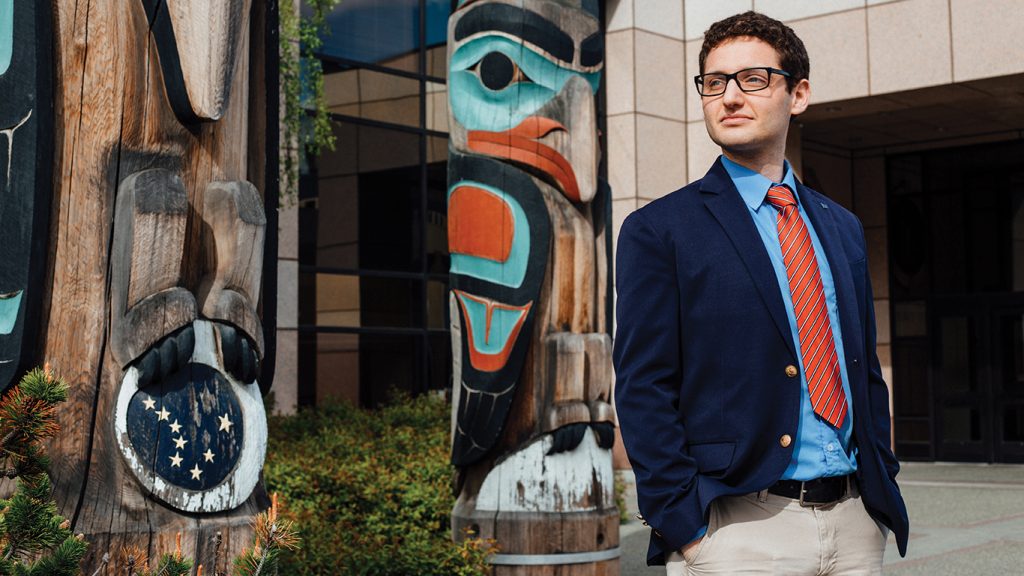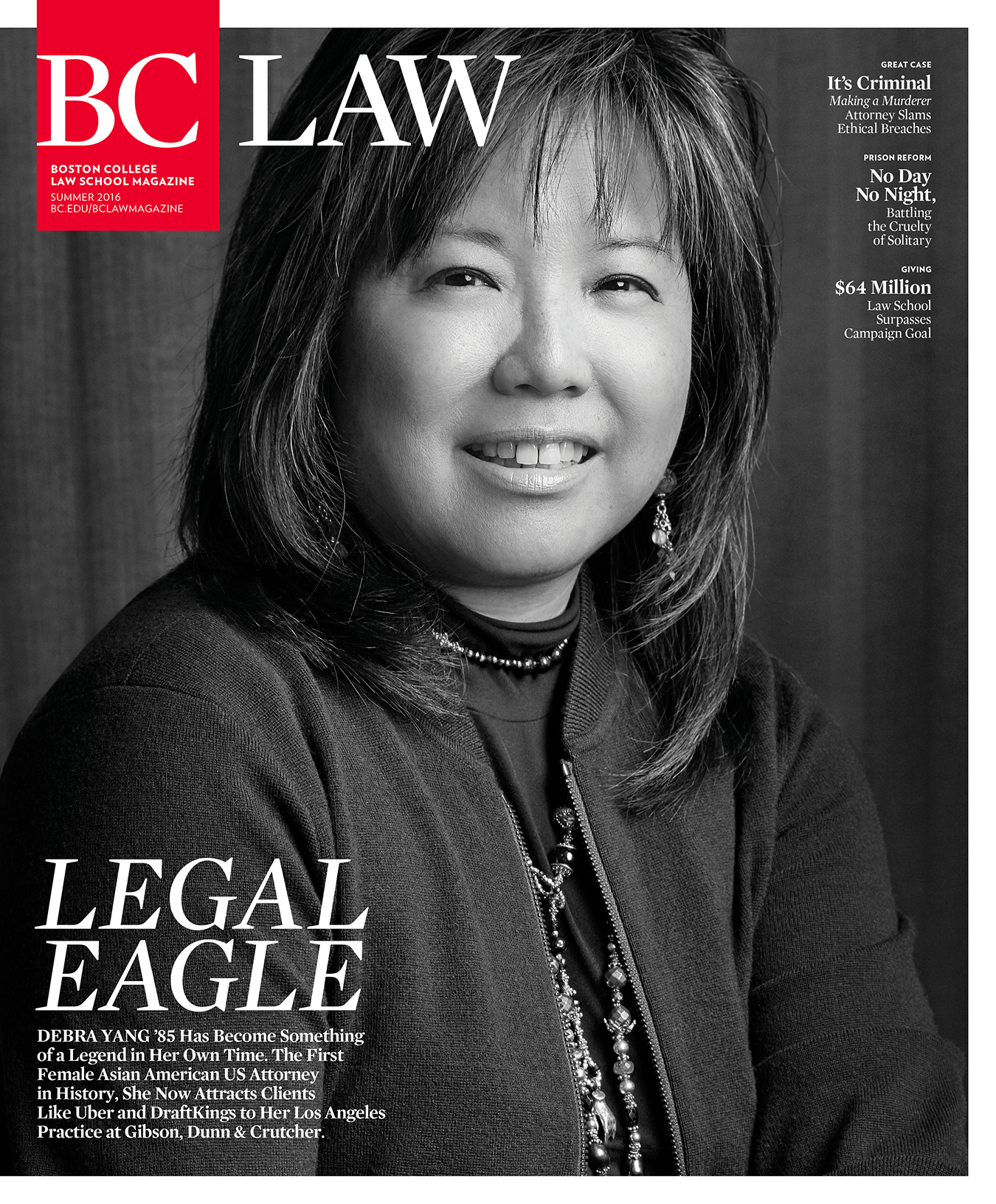Here’s the thing about judicial clerkships. If you want to do one, don’t give up, whether you’re a student or a law graduate. If current trends are any indication, graduates are increasingly attractive to judges—often even more so than are current students, who’ve traditionally been tapped for the jobs.
That’s a lesson that Sam Gottstein ’15 learned when he set his sights on clerking for the Alaska Supreme Court in Fairbanks. Gottstein, an Alaska native and Yale grad who worked as an aid for the Alaska Legislature before attending BC Law, applied for the clerkship the summer before his 3L year. “The Alaska Supreme Court is quite competitive, really,” Gottstein says. “A lot of the justices fly all over the country to conduct interviews at the top fourteen law schools.” Gottstein got a “good” rejection from Justice Daniel Winfree—the justice encouraged him to apply for the following year.
Photo: Sam Gottstein ’15 accepted a clerkship he applied for as a 3L. The experience he earned there made him the winning candidate for a similar position next year with Justice Daniel Winfrey of the Alaska Supreme Court.
Determined to find a clerkship before graduation, however, Gottstein applied to the criminal court of appeals, and when that didn’t work out, he reached out to an attorney he knew who was a former judge. Using the attorney’s connections, Gottstein landed a clerkship with Judge Catherine Easter of the Alaska Superior Court in Anchorage. Judge Easter mostly handles family matters—divorce, child custody, parental rights. She turns to Gottstein, her sole clerk, for help researching and drafting bench memos and opinions on the less routine, more complex legal questions she encounters—questions like whether a person before her has sufficient mental capacity to decide whether or not to divorce.
In addition to the mentoring he receives from his judge, Gottstein is gaining insight into legal practice. “I get to see what kind of work attorneys do. Sometimes you see some good briefs, and many times, you see some terrible briefs. It’s an exercise in what not to do,” he says. He adds that BC Law’s legal writing programs and his time on law review prepared him well for his clerkships.
“Pre-recession, more of our federal clerkship recipients were students, and now that has flipped.” —Christopher Teague, senior associate director of BC Law’s Career Services Office
Next year, Gottstein, who by then will be an experienced graduate, will realize his law school dream. He will be clerking for Justice Winfrey of the Alaska Supreme Court.
Dana Walsh Kumar ’13 had always wanted to clerk for a judge, but when she applied during law school, nothing panned out. She graduated and spent two years at a Wall Street law firm when, suddenly—an opportunity. Judge Cathy Seibel of the United States District Court for the Southern District of New York needed a fourth law clerk for a complex products liability case that was coming to trial. Kumar got the job, and she loves it. “It is a high profile case, so it’s been a good learning experience to see how the lawyers operate,” Kumar says.
Erica Johanson ’05 clerked right out of law school for a state superior court judge in Maine. Then, after practicing for five-and-a-half years, she landed a clerkship with Chief Judge Nancy Torresen of the United States District Court for the District of Maine. “Both of my clerkships were probably the most satisfying years of practice that I have ever had,” she says.
Other alums who are starting clerkships soon are Austin Simko ’13 (Massachusetts Supreme Judicial Court) and Kelli Powell ’11 (United States Court of Appeals for the First Circuit).
These examples speak to the growing trend: judicial clerkships, especially federal clerkships, are increasingly going to experienced alumni. In 2006, 29 percent of federal clerkship applicants were alumni (the rest were law students) and they filed 20 percent of applications. By 2014, 63 percent of applicants were alumni, filing 55 percent of applications. “Pre-recession, more of our federal clerkship recipients were students, and now that has been flipped,” says Christopher Teague, senior associate director of BC Law’s Office of Career Services.
Despite the trend toward hiring alumni, BC Law students continue to be competitive. The Law School recently ranked third in New England after Yale and Harvard for the highest percentage of students securing federal clerkships at graduation over the last three years.
Professor Daniel Coquillette, chair of the Law School’s Judicial Clerkship Committee, attributes the trend to a change in the federal courts’ hiring timeline, with many judges now preferring to hire experienced grads.
Students and alumni whose interests align with a court’s expertise may find that many courts are receptive to them. “State trial courts can offer terrific experience for a litigator,” Coquillette says. A bankruptcy court clerkship would be great for an aspiring bankruptcy lawyer, a probate court clerkship for an aspiring domestic relations lawyer, a patent tribunal or court of claims clerkship for an aspiring intellectual property lawyer.
A judicial clerkship, Coquillette says, “is a really extraordinary experience that can change your whole view of the profession and it is really worth doing.” He invites interested alumni to reach out to the Career Services Office at law.career@bc.edu or 617-552-4345.



